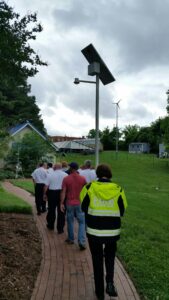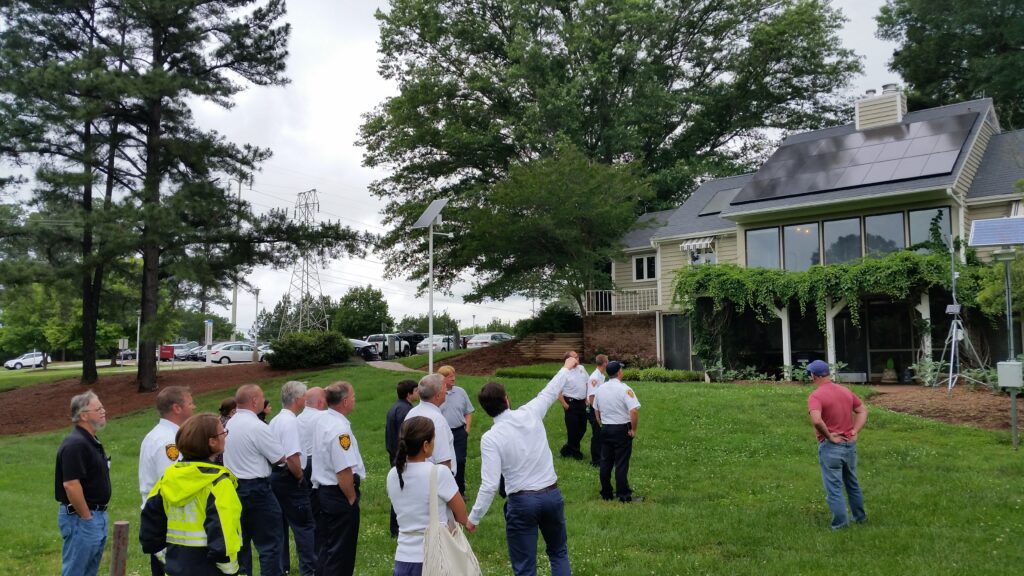Customized Clean Energy Technology Training Services for First Responders
The Training program at the NC Clean Energy Technology Center (NCCETC) seeks to help individuals get the training and credentials they need to launch their clean energy careers and support professionals seeking to integrate clean energy into their day-to-day work. Achieving a sustainable energy economy can only be built from an engaged, highly-skilled workforce across the board- even in industries that may not seem to be related to clean energy at all.
 The NCCETC is always searching for opportunities to work with companies in need of specialized training tailored to their needs. In 2019, NCCETC partnered with SolSmart to deliver a customized Fire Safety Training workshop in the town of Apex. This training focused on firefighter safety and emergency response when dealing with fires affecting solar power systems.
The NCCETC is always searching for opportunities to work with companies in need of specialized training tailored to their needs. In 2019, NCCETC partnered with SolSmart to deliver a customized Fire Safety Training workshop in the town of Apex. This training focused on firefighter safety and emergency response when dealing with fires affecting solar power systems.
Although only a small portion of materials within solar photovoltaic (PV) systems are considered flammable, PV systems installed on buildings can present unique challenges for firefighters responding to the emergency. To allow superheated toxic gases to exit inflamed buildings, firefighters will often ventilate a building’s roof, but rooftop PV systems can sometimes interfere with this technique.
There are several fundamental points of considerations for firefighters when responding to these fires, including being able to identify the existence of a solar power system in the first place. If firefighters are able to identify the type of solar system, they will be better able to isolate and shut down as much of the system as possible and stop the system from continuing to generate electricity so that it may be left in a safe condition.
Through firefighter surveys and assessments of past fires from solar PV systems, SolSmart and NCCETC developed training to familiarize firefighters with solar PV and give them strategies to best handle any building fire equipped with a solar power system.
 The presentation included the essential fundamentals of solar system components such as the solar modules, battery systems and potential storage systems that could be connected to them. Then, it evaluated the potential hazards these systems pose to the firefighters and how they may protect themselves from chemical burns, electrocution, roof loads and hazardous fumes.
The presentation included the essential fundamentals of solar system components such as the solar modules, battery systems and potential storage systems that could be connected to them. Then, it evaluated the potential hazards these systems pose to the firefighters and how they may protect themselves from chemical burns, electrocution, roof loads and hazardous fumes.
Solar PV systems are not the only clean energy technology first responders may need to be familiar with, however. Alternative fuel vehicles are another technology that can be foreign for most first responders.
“Technologies, like solar arrays and electric vehicles, used to be rare sightings on our homes, at our workplaces, and the roads. As these technologies become more common, it is more likely that first responders, fire fighters, and other safety professionals will come into contact with this equipment,” explained Allison Carr, Senior Training Specialist at NCCETC. “We know that these professionals are interested in being prepared now and for the future.”
Solar PV systems are not the only clean energy technology first responders may need to be familiar with, however. Alternative fuel vehicles are another technology that can be foreign for most first responders.
The NCCETC is looking forward to expanding upon training materials for first responders on alternative fuel vehicles (AFVs) and infrastructure. These training materials would enable firefighters and emergency responders to quickly identify different types of alternative fuel vehicles and safely respond in an emergency involving those vehicles and their infrastructure.
Alternative fuel is a rapidly growing industry as the number of light-, medium- and heavy duty AFVs on the road continues to increase dramatically. With an increasing number of vehicles comes an increasing risk of incidents, and AFV have different characteristics and safety concerns than conventional vehicles.
Similar to solar systems, alternative fuels like hydrogen, natural gas, biofuels and electric drive vehicles can cause chemical burns and electrocution. Previously, the NCCETC partnered with the U.S. Department of Energy’s Clean Cities Coalition to create online training modules for Triangle Alternative Fuels First Responders with funding from the American Recovery Reinvestment Act.
According to Carr, the NCCETC’s Training program is currently planning ahead for 2022 and are already organizing customized courses focused on fire safety, quality design and installations of solar arrays, and solar fundamentals for commercial building professionals.
“We want to support your communities, companies and professional organizations to gain the knowledge and skills needed to meet your goals– whether those goals are related to climate change, clean energy, safety improvements, business development, or all of the above,” Carr noted.
If your organization is interested in a customized training that includes coordination of hands-on activities, continuing education credits through organizations like the USGBC or AIA or course materials like textbooks, learn more online or contact the Senior Training Specialist, Allison Carr at akcarr@ncsu.edu.